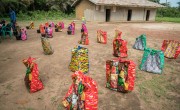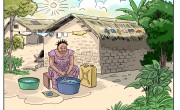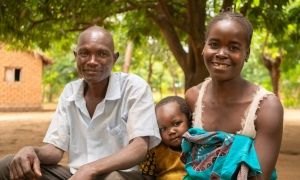
Read our 2024 annual report

Knowledge Hub
Strengthening Menstrual Health and Hygiene
On the 28th May each year, Menstrual Hygiene Day takes place around the world to raise awareness of the importance of good menstrual health and hygiene and to break taboos surrounding menstruation.
For roughly half of the world’s female population (26% of the global population are of reproductive age), menstruation occurs every 23 to 35 days for 2 to 7 days. Despite being a natural, normal and healthy part of life, menstruation is stigmatised around the world, presenting a range of challenges for women and girls.
Menstrual Health and Hygiene (MHH) play a fundamental role in enabling women and girls to reach their full potential. Although menstrual health does not have its own standalone target in the Sustainable Development Goals (SDG), it falls under 4 overarching Goals:
- Goal 3: health and wellbeing
- Goal 5: gender equality
- Goal 6: water and sanitation
- Goal 10: reduced inequalities
According to UN Women, there is growing consensus that managing menstruation is a broader health issue than just hygiene. Menstruation presents a range of challenges for women and girls who are impacted by negative attitudes, cultural taboos and discriminatory traditions. As a result, women are girls are deprived of certain fundamental human rights, including those relating to education, work and health. This turns a simple biological fact into an exacerbated obstacle towards gender equality.
Across the sectors and countries in which we work, Concern’s programmes are guided by a holistic and gender-transformative lens, meaning that we work to challenge underlying gender stereotypes and imbalances to ensure that the impacts of our work are sustainable and lasting. While we acknowledge that not everyone who menstruates is female (and not every female menstruates), advocating for gender equality within the healthcare sector and at the policy-making level has a direct impact on both access to menstrual healthcare and on destigmatising conversations around menstrual, sexual, and reproductive health.
Our reproductive health and education programmes are targeted at all genders to foster this equity whilst our water, sanitation, and hygiene (WASH) programmes include addressing the issue of access to safe and dignified facilities for adolescents, especially in schools. Our emergency responses also include providing dignity and hygiene kits containing period supplies, in order for those whose lives are interrupted by crisis or conflict to have the most basic needs met, as well as their gender and menstrual rights.




Let’s take a closer look at how Concern works to implement Menstrual Health and Hygiene Management through its programming:
Case Study: The Democratic Republic of Congo (DRC)
The DRC, a country in Central Africa with a population of around 115 million, has been facing a protracted security and humanitarian crisis for 25 years. The UN Office for the Coordination of Humanitarian Affairs (OCHA) estimates that 21.2 million people (around 20% of the population) will need some form of humanitarian aid in 2025.
Concern has been working in the DRC since 1994 in several sectors, including food security and livelihoods, gender and protection, WASH, and health and nutrition in the provinces of North Kivu and Tanganyika. Recognised for its expertise in WASH, Concern carries out multi-sectoral interventions with a strong component in the construction or rehabilitation of water and sanitation infrastructures, as well as awareness-raising campaigns aimed at reducing the risks of the spread of water-borne diseases and promoting public health.
Interventions by Concern cover humanitarian emergencies through rapid response to shocks, early recovery actions and development. Concern's interventions also strengthen local capacities and water governance systems to ensure local ownership and sustainability.
Concern DRC supports the improvement of menstrual hygiene by distributing menstrual hygiene products to the most vulnerable women and girls and by raising their awareness of this issue. It works closely with local leaders, women's groups and youth groups to break down the social barriers and stigma associated with menstrual hygiene.





